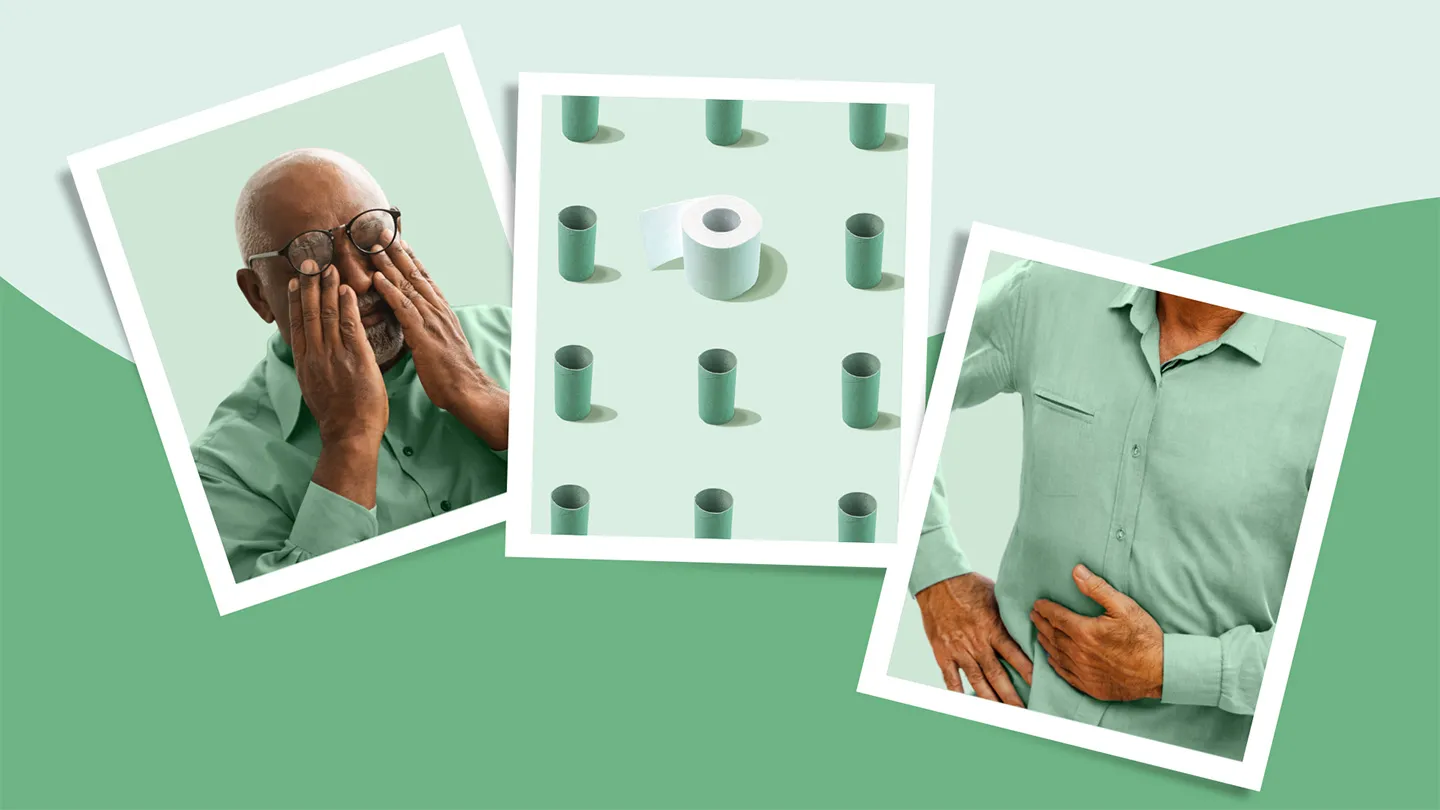Graft-versus-host disease (GVHD) is a severe complication that can occur after someone has received a stem cell or bone marrow transplant from a donor. The immune cells from the donor’s transplanted tissue (the graft) attack the tissues of the person who received the transplant (the host).e60dc2a1-f33c-4a05-9b50-8e3e8e597629171c45c4-d57a-4a5f-ad2a-0e0058f84901 GVHD can be acute or chronic. Depending on the type of GVHD you have and how severe it is, different organs may be affected, causing different symptoms.e60dc2a1-f33c-4a05-9b50-8e3e8e5976298b98032c-a4b1-4401-ac5e-d95fe7165220
Symptoms of GVHD Symptoms In acute GVHD, symptoms start to appear within 100 days after the transplant. In chronic GVHD, symptoms typically start after 100 days of the transplant, last longer, and are potentially more severe.e60dc2a1-f33c-4a05-9b50-8e3e8e597629d439b410-cb9a-4335-b0f8-b1280c0a71cb GVHD has different degrees of severity, and symptoms can vary a great deal depending on the stage and type of illness and the organ affected.e60dc2a1-f33c-4a05-9b50-8e3e8e597629e86e2ba0-c965-4f6b-a0c3-270540aa6d67 Overall, GVHD tends to affect the skin, digestive tract, liver, and lungs.e60dc2a1-f33c-4a05-9b50-8e3e8e5976299922c5c4-34f8-48d4-87a4-945244fc1215 Symptoms can range from a mild skin rash to liver failure.e60dc2a1-f33c-4a05-9b50-8e3e8e5976295eada1b4-4b96-4d2e-ad4a-e13fc5664967 Speak to your doctor if you’ve had a transplant and are experiencing any of the symptoms discussed below. Not every skin rash that appears after a transplant is necessarily a sign of GVHD — your physician will consider all your symptoms and history before reaching a diagnosis. Acute GVHD Usually, acute GVHD affects the skin, digestive tract, and liver, but it can involve any organ. The symptoms can also vary in severity, from a mild skin rash to bloody diarrhea.e60dc2a1-f33c-4a05-9b50-8e3e8e5976294cb90a6c-438a-46ca-80b5-4f96741154a2 Depending on the organ it affects, acute GVHD can cause the following symptoms:e60dc2a1-f33c-4a05-9b50-8e3e8e597629358d0bda-7bf9-44b4-b64d-dad0bd8d6563e60dc2a1-f33c-4a05-9b50-8e3e8e597629eaac37d2-185b-4bc6-a391-1b7cb8e5d53d A skin rash that can appear anywhere on the body but typically starts in the palms, soles of the feet, shoulders, and back of the neck. The skin can be mildly red, sore, or itchy, or look like a sunburn. More severe cases can cause the skin to blister or peel off. Diarrhea , which may be accompanied by other symptoms such as blood in the stool Pale pee or stool Nausea and vomiting Stomach ulcers Loss of appetite or unintentional weight loss Jaundice (yellowing of the skin or eyes) Bleeding, confusion, and a buildup of fluid in the abdomen, which can be signs of liver failure Chronic GVHD Chronic GVHD can affect a single organ or multiple organs at a time. Symptoms can range from mild to severe and may last anywhere from months to years or even a lifetime. Depending on the organs it affects, chronic GVHD can cause the following symptoms, in addition to the symptoms previously for acute GVHD.e60dc2a1-f33c-4a05-9b50-8e3e8e5976291e2d3845-87dd-4762-866a-6457dfeec1f5 Dry, painful, or itchy eyes, sensitivity to light, blurred vision, or blindness Dry mouth, painful mouth sores, difficulty eating, chewing, and swallowing Gum disease or cavities Sensitivity to certain foods and drinks Skin thickening or becoming so tight that it stops your joints from moving properly Ulcers that never heal Intolerance to very hot or very cold temperatures Changes in the way your nails feel or look, brittle nails, or nail loss Hair loss or prematurely gray hair A sensation of food getting stuck in your throat Abdominal (stomach) pain Shortness of breath, persistent cough, or wheezing Swelling in the abdomen Muscle fatigue and cramps Stiff joints Dryness, itching, pain, irritation, ulcerations, or scarring on the genitals Narrowing of the vagina or urethra and painful intercourse
Potential Complications of GVHD Complications If untreated, GVHD can cause several complications, including:e60dc2a1-f33c-4a05-9b50-8e3e8e59762961bb1ec0-02ca-453b-87ad-5f3b03af7a2b Infections that won’t go away or keep coming back Nutritional deficiencies or poor absorption of nutrients Inflammatory conditions that affect the lungs, such as bronchiolitis, interstitial lung disease, and lung fibrosis Inflammation that affects the liver and the bile ducts, causing conditions such as endothelialitis (inflammation of the endothelium, the lining inside blood vessels), bile duct destruction, and pericholangitis (a form of chronic liver disease ) Motility problems (food getting stuck in your throat, stomach not emptying properly, constipation , bowel obstruction ) If you don’t receive prompt treatment for some of these complications (such as infections) they may become life-threatening or even fatal.e60dc2a1-f33c-4a05-9b50-8e3e8e5976299206408f-438e-4d74-a96d-238f9680bff4
When to See a Doctor Doctor’s Visits If you’ve had a transplant and have developed any of the symptoms in this article, you should consult a doctor. Even though many of these symptoms could be caused by something less serious than GVHD, it’s important for a physician to examine you. Early intervention and treatment can go a long way in limiting the severity of the illness.e60dc2a1-f33c-4a05-9b50-8e3e8e5976299e89495d-dc03-4222-a7fe-90aa7ff155e1 Also, keep in mind that symptoms of chronic GVHD can develop a long time after you’ve had your transplant (even years later), so it’s best you consult a doctor as soon as you’ve developed symptoms, particularly if they affect your mouth, eyes, skin, genitals, or joints.e60dc2a1-f33c-4a05-9b50-8e3e8e597629d19ac1a9-af85-44c8-8f70-749514bb738f
The Takeaway Both acute and chronic GVHD can affect several organs and cause symptoms that range from mild to severe. If you’ve had a transplant, either recently or in the past, it’s best to see your doctor if you experience any of these symptoms. Remember that many other conditions that are less serious than GVHD can cause these symptoms, so try not to worry. The best way to figure out what’s going on is to see your doctor. There are many therapies available for GVHD, and early diagnosis and treatment can improve your outcome and limit the severity of the illness.
Resources We Trust Mayo Clinic: Graft-Versus-Host Disease Clinical TrialsCancer Research UK: Diagnosing GVHDLeukemia and Lymphoma Society: Graft-Versus-Host Disease Fact SheetGVHD Alliance: ResourcesBMT Infonet: Support Group
Read the full article here
Leave a comment




